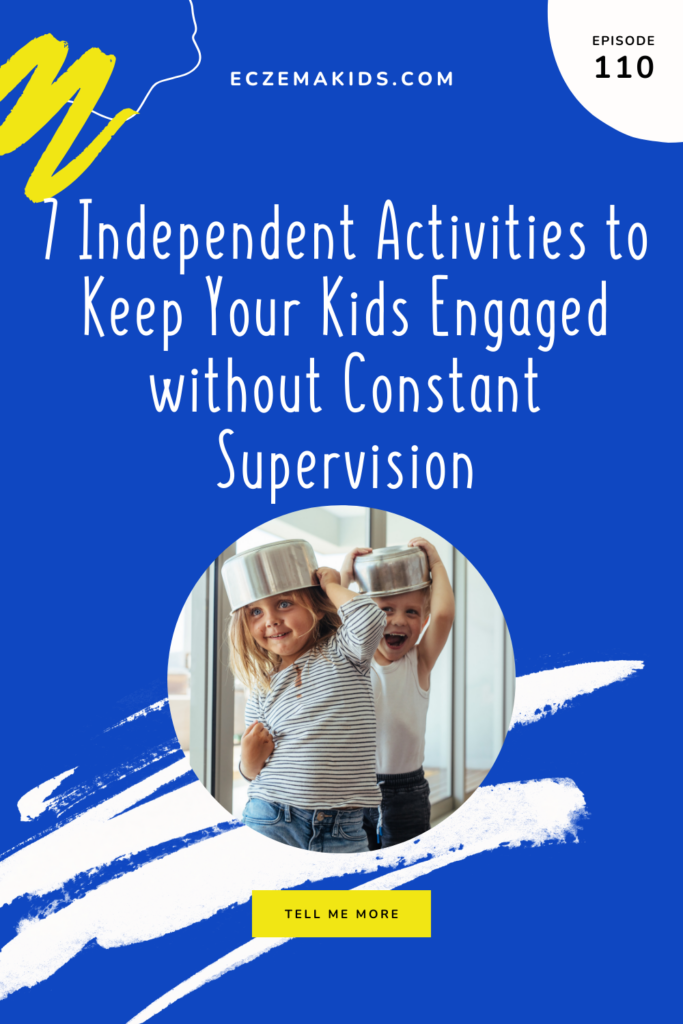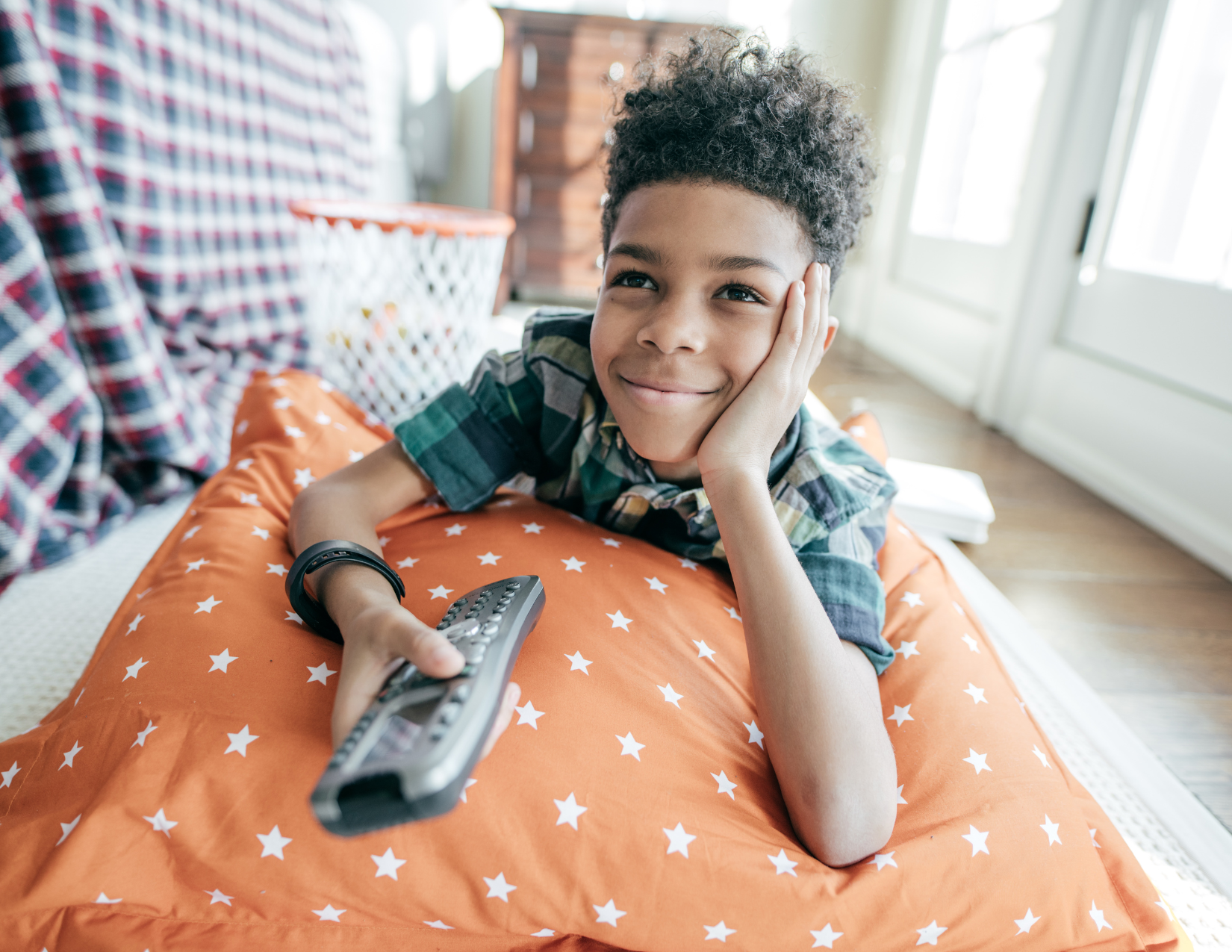Breaking The TV Trap, Even When You’re Exhausted
As the winter chill lingers, enveloping our days in blankets of snow, the urge to cozy up indoors becomes irresistible. And who can blame our little ones for seeking solace in the flickering glow of the TV screen? Yet, amidst the allure of on-demand entertainment, lies a concern gnawing at the hearts of many parents – the impact of excessive screen time on our children’s developing minds.
In the midst of seasonal transitions, illnesses, and the daily juggle of responsibilities, it’s all too easy to succumb to the convenience of TV as a temporary reprieve. If you’re ready to reduce your child’s screen time listen up! Armed with insights and strategies, we can navigate this phase with grace, fostering our children’s cognitive development while preserving their holistic well-being.
Listen Below For The Entire Episode on The Eczema Kids Podcast
Unveiling the Effects of Screen Time on Young Minds
Before delving into solutions, it’s essential to grasp the profound effects of screen time on our children’s brains. From attention span woes to disrupted sleep patterns, the repercussions of excessive TV viewing are manifold and profound.
- Impacts Attention and Focus: The rapid-fire nature of television content can sabotage our children’s ability to concentrate, setting them adrift in a sea of distractions.
- Influences Social and Emotional Development: Unrealistic portrayals and exposure to violence can distort our children’s perceptions of the world, impeding their emotional growth.
- Affects Sleep Patterns: The blue light emitted by screens disrupts melatonin production, leading to restless nights and groggy mornings.
- Impacts Cognitive Development: Time spent in front of the TV robs children of precious opportunities for active exploration and cognitive stimulation.
- Promotes Sedentary Behavior: In a world teeming with boundless wonders, succumbing to the inertia of screen time robs children of the joys of physical activity and exploration.
“Empowering our children with independent activities not only fosters their creativity and self-reliance but also cultivates a love for exploration and learning that extends far beyond the confines of a screen.” -Andra McHugh
How Turning Off the TV Affects Our Kids’ Brains
Let’s delve into what occurs in our kids’ brains when we yield to the temptation of TV and then decide to switch it off, providing an extra incentive to steer clear of excessive screen time. If your child’s reaction from turning off the TV doesn’t persuade you to reduce their screen time holistically, I don’t know what will. My kids are nightmares when we turn off the television, even with fair warning.
When children experience distress upon the cessation of TV viewing, it’s typically attributable to a convergence of factors involving brain activity and behavior. Here’s a breakdown of what may be unfolding in their minds:
- Activation of Reward Pathways: TV viewing can trigger the brain’s reward pathways, inducing the release of dopamine, a neurotransmitter associated with pleasure and reward. Abruptly switching off the TV disrupts this stimulation, prompting a withdrawal-like response.
- Attentional Shift: TV programs often captivate children’s attention, leading to a state of focused concentration. When the TV is turned off, it interrupts this focused attention, causing a jarring transition for children who struggle to shift from the highly engaging TV environment to a quieter activity.
- Habitual Response: Over time, children develop habits or routines around TV watching. Turning off the TV disrupts this established pattern, eliciting a response akin to the discomfort of any abrupt change in routine. The brain may resist this interruption, resulting in emotional reactions.
- Emotional Regulation: For some children, TV watching serves as a coping mechanism for managing emotions or boredom. When the TV is switched off, they lose this familiar coping strategy, leading to feelings of frustration, anxiety, or sadness. Regulating these emotions without the TV stimulus becomes a challenge for the brain.
- Sensory Stimulation: TV programs offer a high level of sensory stimulation through visuals, sounds, and fast-paced editing. When the TV is turned off, the sudden decrease in sensory input can be disorienting for children, causing discomfort or agitation as their brains adjust to the change in environment.
Understanding these complex reactions sheds light on the importance of mindful screen time management and the need to provide alternative outlets for engagement and stimulation.
Navigating Away From the Screen
We know activity without screens is better, but what about when we are exhausted from dealing with our itchy, red kid(s) all night? I hear you and I’ve got you friends. I LIVE in a state of exhaustion, luckily not from eczema anymore, but the normal demands of life with four kids and a job still leave me sleep deprived. Here are my suggestions for reducing your child’s screen time while you get a break! Cheers!
- Bath Time: Let them splash and play in the tub, exploring their creativity and enjoying some relaxing time. Don’t underestimate your older children. Older kids are happy to have some quiet time with a book or toy in the bath by themselves. Give it a try!
- Library Visits: Encourage a love for reading by taking them to the library to pick out books that capture their imagination. They can run around and find books, you can bring your laptop and get work done, or maybe just drink a tea in peace.
- Sports: Whether it’s kicking a ball around or shooting hoops, sports activities offer a great outlet for energy and teamwork. Double points if they can be on a team, engaging with an adult that isn’t you:)
- Play Kitchen Adventures: Engage their imagination with play kitchen setups, allowing them to explore culinary creativity without the real mess. We leave out our dramatic play kitchen setup at all times… I do not want to take things out and put them away when I’m really tired, it needs to be a mainstay.
- Reading Time: Set aside quiet moments for reading, even if they aren’t old enough to read. This fosters a lifelong love for books and storytelling and could give you a break. I love The Good and the Beautiful book lists! You can filter by level or genre. All books on their extensive lists are clean, uplifting and parent approved!
- Rec Center Fun: Take advantage of community centers or recreational facilities for their swimming pools, slides, hot tubs and gymnasiums… all without your participation if they are old enough!
- Trampoline Park Excitement: Let them bounce their way to fun and fitness at a trampoline park, providing a safe environment for energetic play. Most have a working-parent skybox up top.
- Outdoor Exploration: If you have a backyard, encourage outdoor play, where they can connect with nature, get some fresh air, and let their imaginations run wild.
These activities not only promote independence and creativity but also provide valuable opportunities for physical activity and cognitive development.
Mindful Parenting and the Allure of Screens
As we bid adieu to the icy grip of winter and usher in the promise of spring, let’s embark on this journey of mindful parenting with renewed vigor and determination. By steering clear of the seductive allure of screens and embracing alternative avenues for growth and exploration, we pave the way for our children to flourish – not just academically, but as vibrant, resilient individuals ready to conquer the world one adventure at a time. So let’s reclaim our children’s childhoods from the clutches of the TV screen and nurture young minds that bloom with boundless curiosity and creativity!
If you’re hoping to continue the conversation surrounding reducing screen time for kids, try Parenting Without Power Struggles or I’m Barely Hanging On, Thanks for Asking.


FAQ
We are used to having the TV on most of the time while home in the background. What should I do first to reduce my kids’ screen time?
Transitioning away from constant TV background noise can feel daunting, but taking the first step is crucial. Start by designating specific screen-free times, such as meal times or certain hours in the evening. Our screen-free hours are all weekdays. Encourage alternative activities during these times, like reading together, engaging in outdoor play, or exploring creative projects. Once they get used to the screen-free rules you will be able to step back and use that time to work, make dinner or relax. By gradually replacing screen time with enriching experiences, you’ll not only reduce your kids’ exposure to screens but also foster a healthier and more connected family environment
